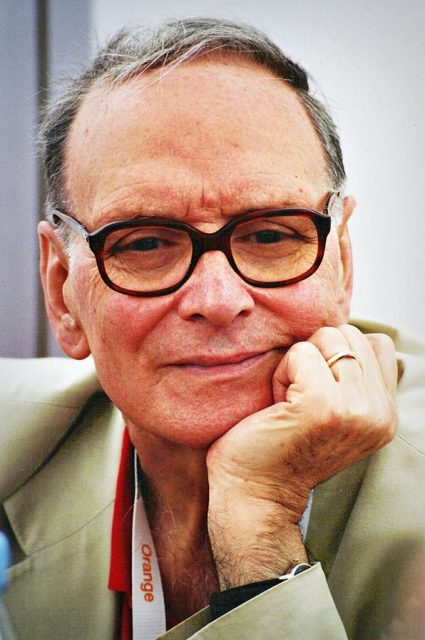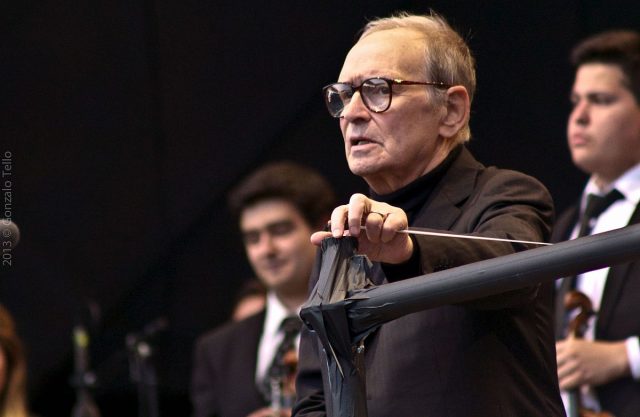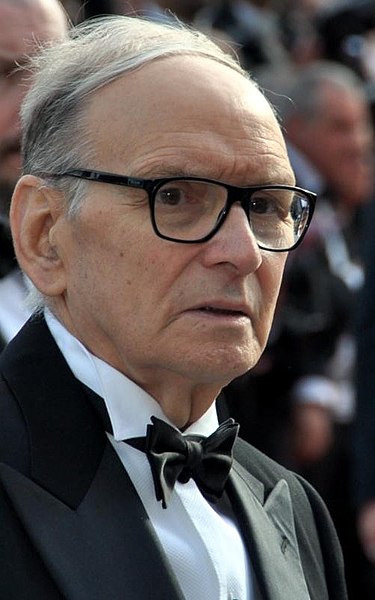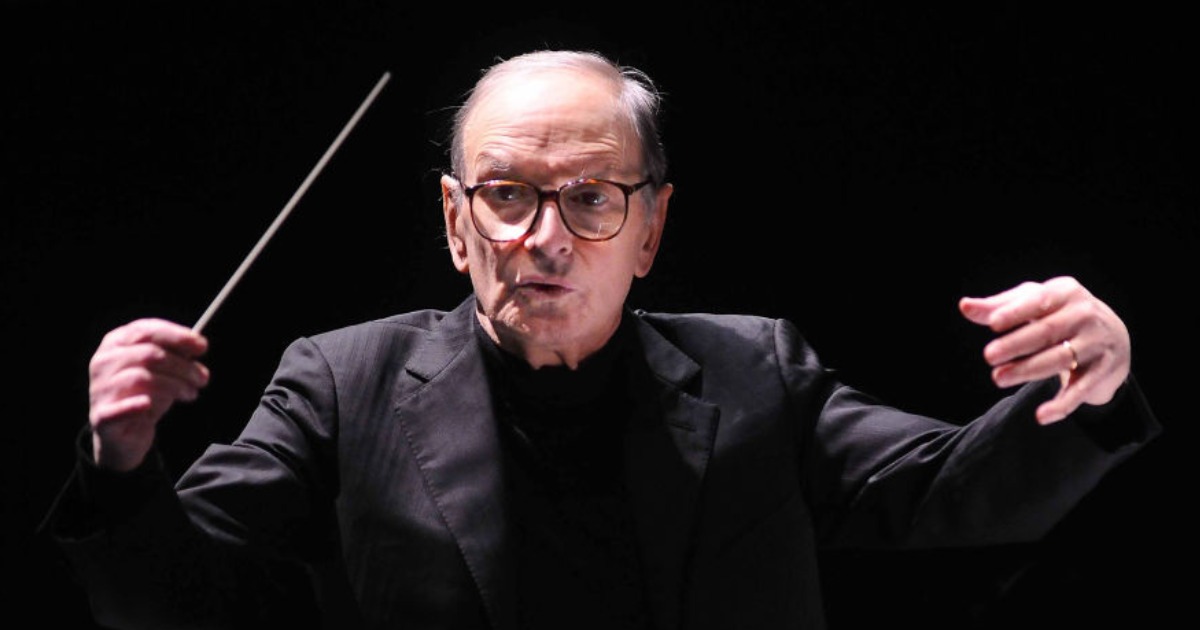Ennio Morricone has died at the age of 91. Arguably the most influential movie composer who ever lived, his music is familiar to audiences around the world. Morricone passed away on Monday in Rome, city of his birth, where he’d lived all his life. Cause of death is reported as complications arising from a fall and broken femur.
His collaborations with some of the true greats of cinema echo through the ages. Rising to prominence with Sergio Leone – with whom he went to school – he added the iconic twangs, whistles and harmonicas to the director’s “Dollars trilogy” (1964-66).
“Added” is probably the wrong word – for Leone, his friend’s compositions were an essential part of creating the film. The Guardian notes, “he once remarked that part of the reason Sergio Leone’s westerns were so slow was that certain scenes were extended in order to accommodate his soundtrack, a luxury that seems almost unthinkable in today’s film industry.” In some cases the music was finished before a frame was shot.

Morricone disliked the term “spaghetti western”, feeling there was more to his career. No arguing about that – his work moved viewers from the Old West to classic gangster battles in the big cities. His final collaboration with Leone was 1984 crime saga Once Upon A Time In America, which he regarded as his best. Three years later his score accompanied Eliot Ness’s pursuit of Al Capone in Brian De Palma’s The Untouchables (1987). Robert De Niro starred in both movies, as well Morricone-scored historical drama The Mission (1986), directed by Roland Joffé.

In a 2016 interview for The Guardian, Morricone opened up about his process. Despite a reported distaste for excessive screen carnage, he felt that vibe played a role in establishing the music. “You have to convey this idea of violence, so you do that firstly by working on the register and timbre of the music” he revealed. “You try to take each instrument’s range to the extreme. Because the suffering of the musician playing in that way – which is quite difficult – has to resemble the suffering that the victims of those violent scenes endured.”

Another triumph for Morricone was Cinema Paradiso (1988), a evocative tale of a man’s life long passion for cinema. Winning an Oscar for Best Foreign Language Film, it was written and directed by Giuseppe Tornatore, another creative partner of the composer’s. Bernardo Bertolucci, Samuel Fuller, Dario Argento, Terrence Malick… the list of directors goes on. Morricone worked on over 500 movies spanning the decades. In 2015 he scored Quentin Tarantino’s The Hateful Eight. His last work was for Italian romantic drama The Correspondence (2016).
One helmer who didn’t get to work with Morricone but wanted to was Stanley Kubrick. Morricone may not have been too pleased with his pal Sergio Leone, who informed Kubrick that he was busy composing for one of his movies. Turns out he wasn’t! If things had worked out, he would have scored ‘A Clockwork Orange’ (1971). This was a major missed opportunity in an otherwise prolific body of work.
It all started back in Rome, 1928. Morricone’s father Mario was also a musician. Mother Libera ran her own textile business. Mario played the trumpet and young Ennio soon learned to blow his own. He began making music at 6, going on to finish a 4 year harmony program at a conservatory in just 6 months. Formative figures in his life included composer Goffredo Petrassi.
Morricone played various instruments from an early stage. This variety helped him stand out. His scores could be multi-layered or surprisingly sparse. “Morricone’s spare focus on one instrument — like the trumpet solo in The Good, the Bad and the Ugly, or the oboe, which soared over a lushly reverent backdrop in The Mission — enriched his contributions” writes The Hollywood Reporter (THR).
Before reaching the big screen, he worked in the theater and on radio dramas. The first film he composed for was 1961’s The Fascist. He’d previously written a score for comedy Le Pillole Di Ercole, but ended up being replaced by another musician!
Studio arranger at RCA Victor is another notable entry on his resume. He went on to inspire and work with the best artists in the business, a varied line up that included Joan Baez and Metallica. The latter used Morricone’s ‘The Ecstasy of Gold’ from The Good, The Bad and The Ugly as their intro track during live performances. “Metallica take to the stage to his music;” writes the Guardian, “the Ramones used to exit to it.”
He also crafted memorable tracks for the small screen. In 1981 his theme for BBC Wales drama ‘The Life and Times of David Lloyd George’ climbed the UK hit parade to reach no.2.
For such a grand figure, Morricone appeared to lead a relatively simple life. He didn’t speak English and worked from his desk. He remained something of a traditionalist. BBC News says, ”He even opted for handwritten scores over the newly modernized forms of computer scoring.” That said, Morricone was also praised for being avant garde.
Often nominated for an Academy Award, he finally won one for ‘The Hateful Eight’. An Honorary Oscar had been bestowed in 2007. Golden Globes were forthcoming for ‘The Mission’, ‘The Legend of 1900’ (1998) and his score for Tarantino. He bagged 4 Grammys and was particularly blessed at the BAFTAs (6 awards).
A Roman Catholic, Morricone married lyricist Maria Travia in 1956. Their children are Marco, Alessandra, Andrea and Giovanni. Andrea is a movie composer (working with his father on ‘Cinema Paradiso’) and Giovanni a filmmaker.
Hans Zimmer is another epic composer who found inspiration in Morricone’s work. “The first note I ever heard of his grabbed hold of me and wouldn’t let me go” he tweets. “I never decided to become a film composer. Ennio and Sergio Leone did that for me, letting me experience their magic.”
“I’ll never forget the way Ennio Morricone described music as ‘energy, space, and time.’” writes Yo-Yo Ma. “It is, perhaps, the most concise and accurate description I’ve ever heard. We’ll truly miss him.” This message features Yo-Yo Ma performing the ‘Cinema Paradiso’ love theme.
Metallica write: “Your career was legendary, your compositions were timeless. Thank you for setting the mood for so many of our shows since 1983.”
“Where to even begin with iconic composer Ennio Morricone?” says director Edgar Wright. “He could make an average movie into a must see, a good movie into art, and a great movie into legend.”
Wright adds, “He hasn’t been off my stereo my entire life.” What better way to pay tribute to “The Maestro”. RIP.
Steve Palace is a writer and comedian from the UK. He’s a contributor to both The Vintage News and The Hollywood News and has created content for many other websites. His short fiction has been published in Obverse Books.
